20+ SAMPLE Real Estate Statement
-
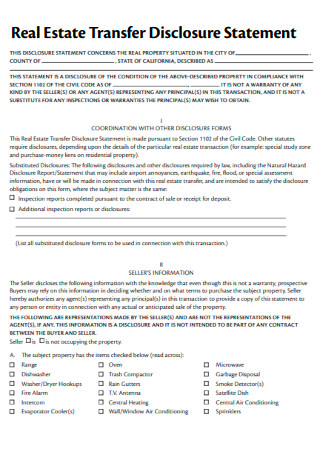
Real Estate Transfer Disclosure Statement
download now -
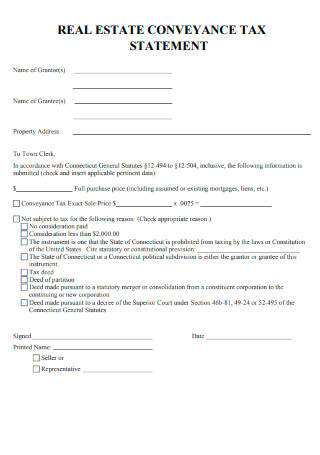
Real Estate Conveyance Tax Statement
download now -
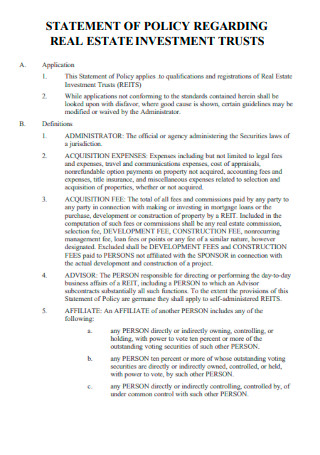
Statement of Policy Regarding Real Estate Investment Trusts
download now -
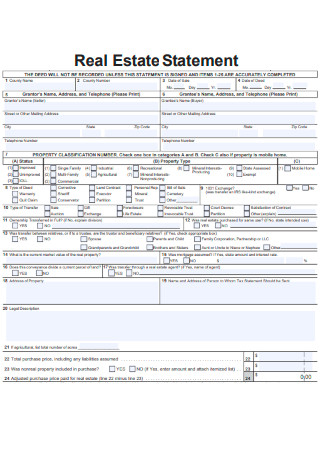
Sample Real Estate Statement
download now -
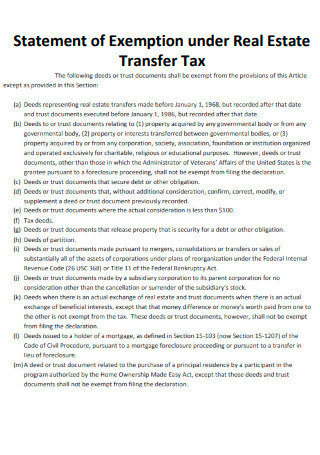
Statement of Exemption under Real Estate Transfer Tax
download now -
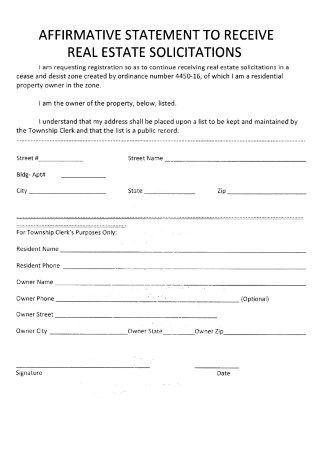
Affirmative Statement to Receive Real Estate Solicitations
download now -
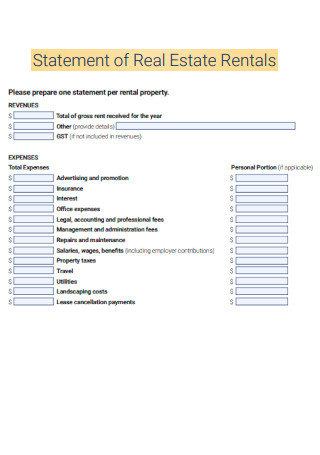
Statement of Real Estate Rentals
download now -
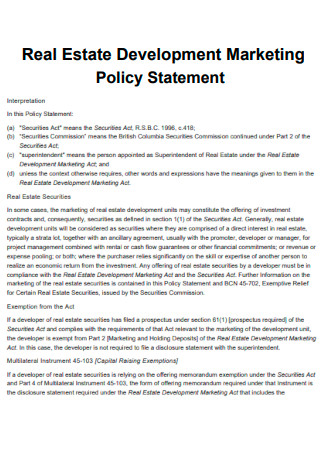
Real Estate Development Marketing Policy Statement
download now -
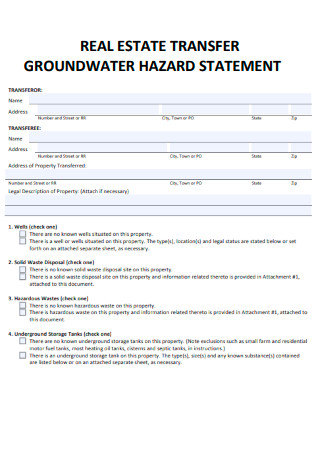
Real Estate Transfer Groundwater Hazard Statement
download now -
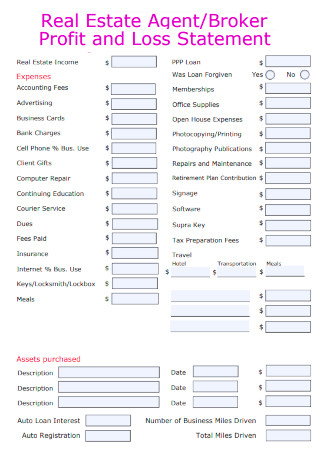
Real Estate Agent & Broker Profit and Loss Statement
download now -
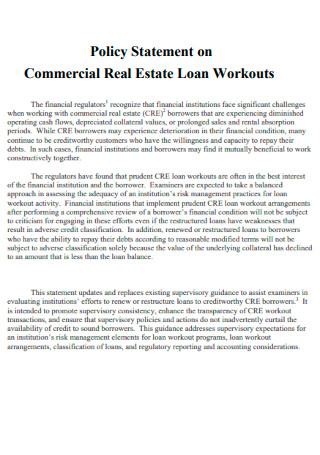
Policy Statement on Commercial Real Estate Loan Workouts
download now -
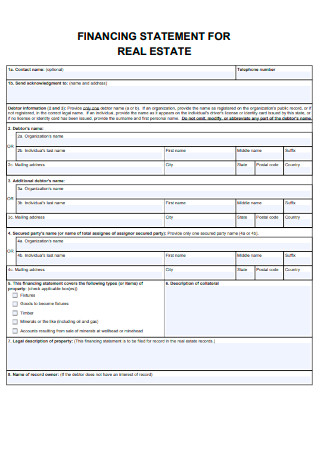
Financing Statement for Real Estate
download now -
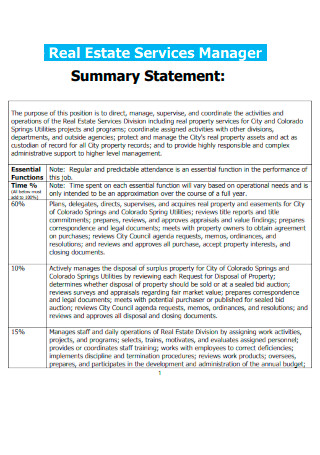
Real Estate Services Manager Summary Statement
download now -
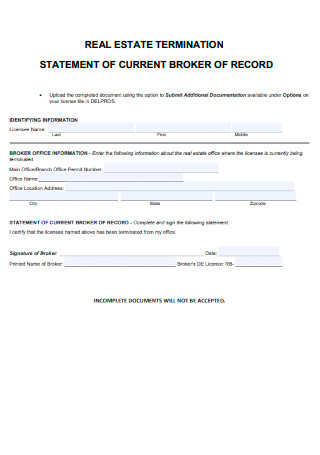
Real Estate Termination Statement of Current Broker of Record
download now -
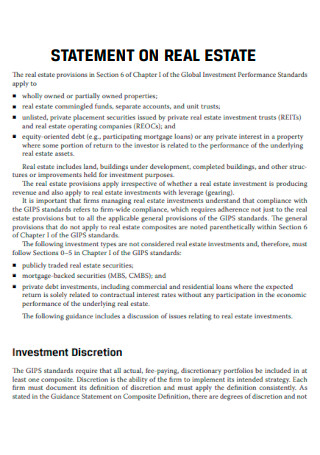
Basic Real Estate Statement
download now -
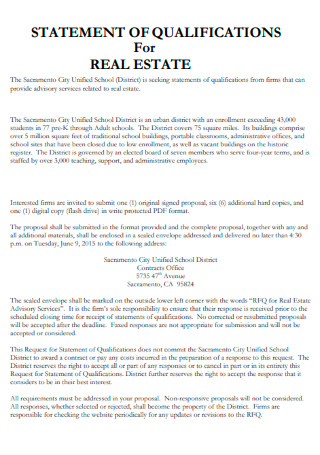
Statement of Qualifications for Real Estate
download now -
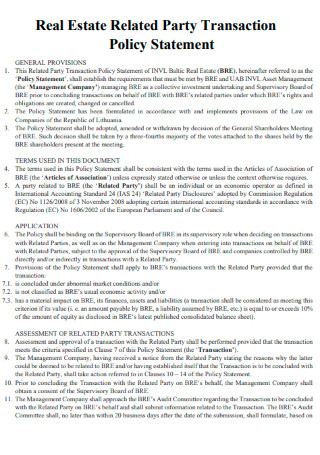
Real Estate Related Party Transaction Policy Statement
download now -
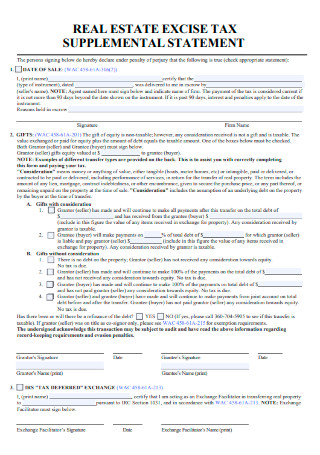
Real Estate Excise Tax Supplemental Statement
download now -
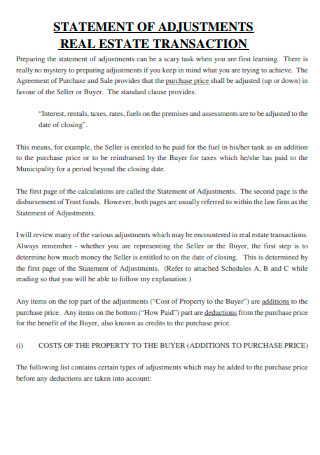
Statement of Adjustments Real Estate Transaction
download now -
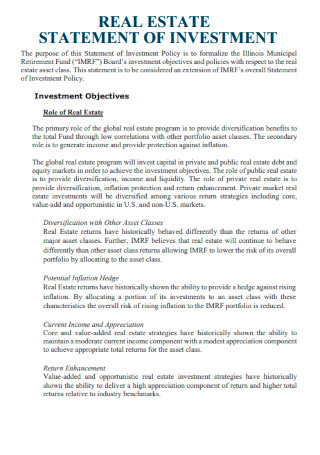
Real Estate Statement of Investment
download now -
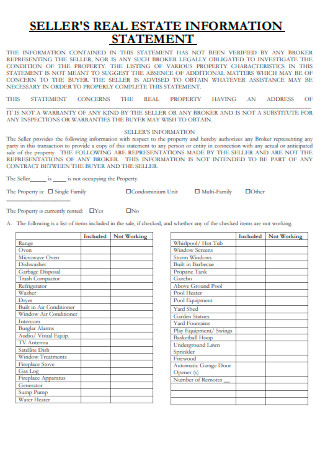
Sellers Real Estate Information Statement
download now
FREE Real Estate Statement s to Download
20+ SAMPLE Real Estate Statement
a Real Estate?
Benefits of Investing in Real Estate
Tips to Make a House a Good Investment
How To Find a Reliable Real Estate Agent
FAQs
Why is real estate business profitable?
Are real estate agents compensated by the hour?
Is it challenging to succeed as a real estate agent?
What Is a Real Estate?
Real estate consists of land, the natural resources on or beneath it, and any attached structures. It may include homes, commercial facilities, or undeveloped land in contrast to personal property, such as automobiles, jewelry, or artwork, which can easily be relocated. According to statistics, 82% of all real estate transactions originate from referrals.
Benefits of Investing in Real Estate
We are all, to some extent, aware of the potential financial benefits of real estate investing. The benefits of real estate investment outweigh the costs, and as a real estate investor, you could earn a steady income to secure your financial independence over the long term. Whether you want to leave your mundane 9-to-5 job to become a full-time real estate investor or save for your retirement, you can achieve your financial objectives sooner than you might think. One rental property is sufficient to establish a real estate business and secure a steady source of rental income. Before purchasing your first rental property, you should conduct a real estate market analysis and consult with an expert. It will help you make prudent and calculated real estate investment decisions to grow and diversify your portfolio to reap financial benefits. Do not rely on luck to make money in real estate; there is no magic formula; it is all about researching potential investments before closing a deal. Furthermore, if you want to succeed in this industry, you must know everything about real estate, including the short- and long-term benefits. Here are seven significant advantages of investing in real estate today.
Tips to Make a House a Good Investment
One of the main reasons people buy real estate is to have a place to live. But not everyone can buy their dream home, even if they have the money to do so, even more so when there are other essential things to pay for, like college or retirement. Most people buy homes, but some rent them out to make money. If you want to make money by renting out your property, you need to take steps first.
1. Find out how much rent is in your area.
Before putting your home up for rent, it is essential to undertake extensive research on the local rental market. You must be aware of the average market value of comparable homes and properties in terms of size and location. This is essential to provide a competitive price for your home while still covering maintenance and operating costs.
2. Identify Financial and Tax Issues Related to Rentals
Another essential part of renting out your property is evaluating the tax obligations associated with rental income. Even though most rental properties are subject to taxation, exemptions are possible under Philippine legislation. Please consult a local tax expert or learn more about these applicable taxes, including their rates, bases of computation, deductions/allowable expenses, documentation required for filing, payment due dates, and late payment penalties.
3. Prepare your Landlord-Tenant Agreement documents
Before doing anything else, make sure you have all the documents for your real estate property, such as deeds of assignment, tax declarations, title transfer documents, inventories or appraisal reports, etc. When you’re done with your research, make a contract or agreement with your tenants. The contract should include all the terms and conditions between you and your tenant about the rental property. This consists of the rental rates, maintenance costs, payment schedule, rules for living there, and fees for things like eviction or ending the lease.
4. Consider Needed Repairs and Upgrades
You must also evaluate the property’s essential repairs, upgrades, and other maintenance expenses. Before renting out your property, set aside an estimate of how much you will spend on routine home maintenance and other housekeeping bills. Thus, you can better manage the finances required to keep its pristine shape. Before advertising your rental property on listing sites, you should check that all repairs and improvements have been completed. Ultimately, nothing attracts prospective tenants more than a well-maintained house.
5. List and market homes with real estate agents.
Work with real estate agents who can assist you in marketing your rental property. They have experience ensuring that the necessary changes do not come out of your pocket or budget. In addition, they handle selling the property, publicizing its details, and even showing prospective renters the rental apartment itself. Remember to record any transactions associated with renting out your home to be aware of the current status. This will prevent misconceptions that could lead to disagreements between you and your tenant.
How To Find a Reliable Real Estate Agent
Buying a home is an achievement and one of the most important financial decisions you will ever make. Finding a professional real estate agent to guide you through the purchasing process is essential when you’re ready to purchase. Real estate agents compete via web advertisements, newspaper listings, and yard signs. However, there are so many professionals to pick from that it can be hard to locate the correct one. Follow these steps to choose a real estate agent to hire the ideal professional for your transaction.
1. Obtain pre-approval for a mortgage.
Occasionally, homebuyers engage a real estate agent and begin their property search before speaking with a mortgage lender. However, it is prudent to see a lender determine how much you can afford. Preapproval for a mortgage lets you know the maximum amount you can borrow and identifies any difficulties to address early on. This allows you to focus on homes within your price range. Additionally, it will demonstrate to prospective real estate brokers that you are a serious buyer. In competitive markets like today’s, sellers will not even consider your offer without a preapproval letter.
2. Ask your friends and family for recommendations.
Request recommendations from your network for a real estate agent with whom they had a positive experience. The ideal prospect will have experience working with clients similar to yourself. For instance, the needs of first-time purchasers are distinct from those of recurrent buyers or downsizing homeowners. Also, become acquainted with the distinction between a buyer’s agent and a seller’s agent. A buyer’s agent represents a homebuyer in a real estate transaction. In contrast, a seller’s or listing agent handles the seller’s side, including pricing and marketing the home and negotiating the conditions of the sale. Dual agency refers to instances in which a single real estate agent can represent both parties. If you consider agreeing to this arrangement, keep this in mind, as some states prohibit dual agency and inherent risks. You may also encounter an agent who acts as a referral agent, leading other agents for a commission.
3. Investigate prospective recruits
Examine an agent’s online presence first. Examine the agent’s website and social networking profiles. Additionally, examine their online reviews. Worry not about one or two unfavorable reviews, but more than that could indicate a problem. Check with your state’s real estate authority to determine whether a prospective agent is licensed and free of disciplinary actions. Check the website of your local Better Business Bureau to discover if the candidates you’re interviewing have received any complaints. Creating a wish list and must-haves of what you’re looking for in a home is a brilliant idea when you’re researching to discover the ideal real estate agent.
4. Interview a minimum of three realtors
The interview is your opportunity to gauge the agent’s style and expertise. You’re searching for someone knowledgeable about a specific field and understands your budget and needs. Ask how long they have been a real estate agent, how many clients they presently have, and how long they generally work with homebuyers to close on a property. It’s also a good idea to inquire about the average price range and area of properties they assist buyers in locating, how they assist buyers in remaining competitive in this market, and their commission rates. You can also discover the agent’s preferred form of communication and their availability through interviews. For instance, if you choose to text and plan to tour properties after work, you’ll need an agent willing to do the same.
5. Request references — then confirm
Ask the agents you’re thinking about to tell you about the homes they’ve listed and sold in the last year and give you the contact information for at least a few of their recent clients. Call clients to discover how they felt about the process and what help the agent gave them. Ask them if they would hire that agent again when they bought or sold a home.
6. Follow your heart.
An agent’s knowledge and experience can lead you with ease. Choose an agent with complete confidence and feel at ease if closing becomes rough. If everything checks out, but you don’t feel connected, you should not travel. Numerous other real estate agents can assist you and maybe a better personality match.
7. Scrutinize your agreement.
Once you have chosen an agent, the terms of your agreement, including the real estate commission, should be spelled out in your contract. Traditionally, the seller pays 6% of the home’s selling price in real estate commissions, with half going to their agency and half to the buyer’s agent. The commission rate is frequently negotiable—another aspect to consider is the contract’s duration. Target a contract duration of six months or less. According to the NAR, it can take 20 days or less to sell a home in a competitive seller’s market such as the present one. If you haven’t found the home you want within a few months, it’s beneficial to maintain flexibility.
FAQs
Why is real estate business profitable?
Real estate consistently outperforms other assets and improves in value over time. In addition, it is less susceptible to short-term volatility than the stock market. Whether renting out an apartment or business building for income or buying a home, you obtain a physical, useable asset.
Are real estate agents compensated by the hour?
No, real estate agents are not compensated hourly. Instead, agents are paid on commission. The amount of commission an agent makes will depend on various factors and will likely vary amongst agents.
Is it challenging to succeed as a real estate agent?
As a real estate agent or seller, it isn’t easy to achieve success and earn a sustainable living. It involves a significant investment of time, effort, and even money.
In the hypercompetitive property market of today, the right real estate agent can make all the difference. It will help if you have someone you can trust, who makes you feel at ease, and who can guide you with your best interests in mind. The more a buyer’s agent’s familiarity with a specific location, the more probable it is that they can steer you toward the ideal property at the perfect price within your desired time frame and budget.
